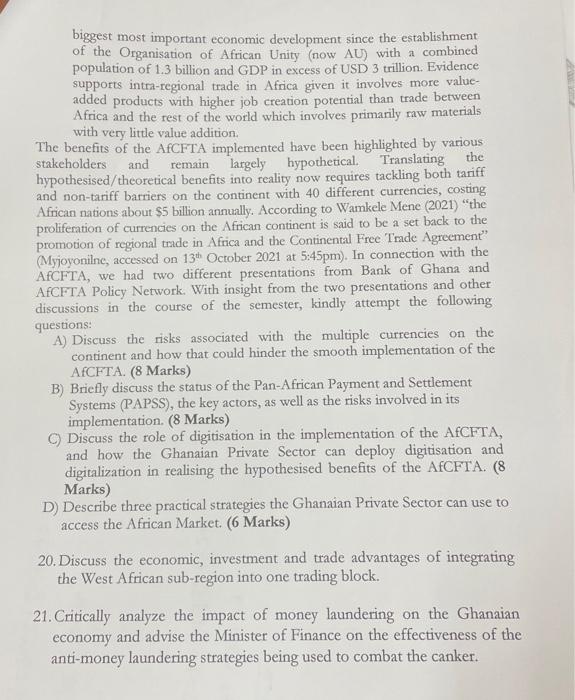19. Africa has embarked on an ambitious economic transformation agenda through the coming into force of the African Continental Free Trade Agreement (AfCFTA). So far 54 out of the 55 countries on the continent have signed the agreement whilst 36 countries have ratified the agreement and lodged same with the African Union. The Agreement entered into force in May 2019 after ratification by 22 Member States with trading starting from the 1tt of January 2021. African continental free trade with commercial significance is thus birthed and perhaps the biggest most important economic development since the establishment of the Organisation of African Unity (now AU) with a combined population of 1.3 billion and GDP in excess of USD 3 trillion. Evidence supports intra-regional trade in Africa given it involves more valueadded products with higher job creation potential than trade between Africa and the rest of the world which involves primarily maw materials with very little value addition. The benefits of the AfCFTA implemented have been highlighted by various stakeholders and remain largely hypothetical. Translating the hypothesised/theoretical benefits into reality now requires tackling both tariff and non-tariff barriers on the continent with 40 different currencies, costing African nations about $5 billion annually. According to Wamkele Mene (2021) "the prolifemation of currencies on the African continent is said to be a set back to the promotion of regional trade in Africa and the Continental Free Trade Agreement" (Myjoyonilne, accessed on 13th October 2021 at 5:45pm ). In connection with the AfCFTA, we had two different presentations from Bank of Ghana and AfCFTA Policy Network. With insight from the two presentations and other discussions in the course of the semester, kindly attempt the following questions: A) Discuss the risks associated with the multiple currencies on the continent and how that could hinder the smooth implementation of the AfCFTA. (8 Marks) B) Briefly discuss the status of the Pan-African Payment and Settlement Systems (PAPSS), the key actors, as well as the risks involved in its implementation. (8 Marks) C) Discuss the role of digitisation in the implementation of the AfCFTA, and how the Ghanaian Private Sector can deploy digitisation and digitalization in realising the hypothesised benefits of the AfCFTA. (8 Marks) D) Describe three practical strategies the Ghanaian Private Sector can use to access the African Market. (6 Marks) 20. Discuss the economic, investment and trade advantages of integrating the West African sub-region into one trading block. 21. Critically analyze the impact of money laundering on the Ghanaian economy and advise the Minister of Finance on the effectiveness of the anti-money laundering strategies being used to combat the canker








